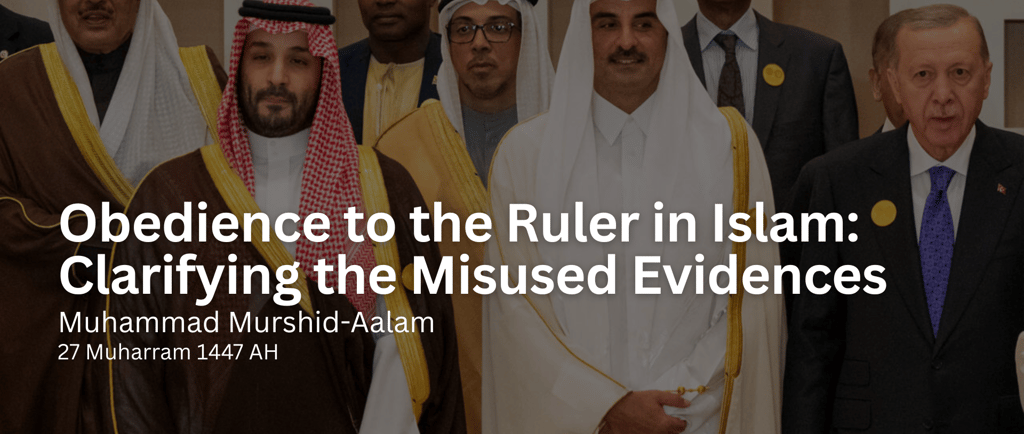
Obedience to the Ruler in Islam:
Clarifying the Misused Evidences
Muhammad Murshid-Aalam
27 Muharram 1447 AH
Obedience to the Ruler in Islam: Clarifying the Misused Evidences
In recent times, we have witnessed the repeated use and abuse of certain Quranic verses and hadiths commanding obedience to rulers. This article clarifies the evidences and the correct position when it comes to obeying the ruler.
ARTICLES


In recent times, we have witnessed the repeated use and abuse of certain Quranic verses and hadiths commanding obedience to rulers. These evidences are often misrepresented to push a narrative that Muslims must remain silent, passive, and unquestioning toward today’s Muslim rulers, no matter how corrupt, oppressive, or treacherous they are. This manipulation is most commonly seen among the Madkhali movement and similar groups who call for blind loyalty to tyrants under the statement of “obeying the ruler,” often serving the agendas of these rulers, whether for financial gain, status, or due to a lack of sincere knowledge. This is a dangerous distortion of Islam.
What Does the Qur’an Really Say?
Allah says in the Qur’an:
“O you who believe! Obey Allah and obey the Messenger and those in authority among you…”
— Surah An-Nisa (4:59)
This verse is frequently quoted to justify unconditional obedience to any Muslim leader. But there are several critical points to understand:
The obedience to rulers is conditional, notice how Allah (swt) says “Obey Allah and obey the Messenger” using the command “obey” (أطيعوا) twice, but when it comes to the rulers, He does not repeat the command. Scholars like Imam Al-Jassas (ru) and others have noted this implies that obedience to rulers is conditional on their obedience to Allah (swt) and His Messenger ﷺ.
The verse continues:
“…If you disagree over anything, refer it to Allah and the Messenger, if you should believe in Allah and the Last Day.”
This part clearly shows that the final authority is always the Qur’an and Sunnah. If rulers command something that contradicts revelation, their command is not to be followed.
What Did the Prophet ﷺ Say?
Ali (ra) reported that The Messenger of Allah ﷺ said:
“There is no obedience to the creation in disobedience to the Creator.”
(Bukhari 7257, Muslim 1840)
This makes it absolutely clear: obedience to the ruler is not absolute, and is only valid as long as the ruler rules by the Qur’an and Sunnah.
Who Are “Those in Authority”?
The classical scholars, including the likes of Imam Al-Qurtubi, Ibn Kathir, and others, understood “those in authority” to be either:
The legitimate Caliphs (i.e., rulers who rule by Islam comprehensively, under a unified Ummah), or
The scholars of Islam, who carry the trust of the deen and guide the Ummah in truth.
Today’s rulers, who divide the Muslim lands, serve the interests of the West, allow riba, legalise indecency, oppress their people, and often rule by man-made laws, do not meet the conditions of legitimacy outlined by the Shariah. They are not Khulafaa and they did not ever claim to be, nor do they represent the Islamic concept of Imarah (leadership) as established by the Prophet ﷺ and the rightly guided caliphs, which was carried until the fall of the Ottoman Khilfah in 1924.
To use the verse about “obeying the rulers” to demand loyalty to such people is a betrayal of the Qur’an itself.
The Misuse by the Madkhalis
The Madkhali movement and their offshoots are notorious for cherry-picking evidences to support despotic regimes, silencing voices of truth under the banner of “unity” or “avoiding fitnah.” Many of them actively:
Attack sincere da’wah carriers who speak the truth to power,
Label those calling for Islamic revival and Khilafah as “Khawarij,” and
Support regimes that actively ally with enemies of Islam.
Their misuse of religious texts is not just wrong, it is manipulation. It either stems from:
Being paid or funded by governments to promote their agenda,
Hypocrisy, claiming to follow the Sunnah but defending clear batil,
Or ignorance, not having the depth of knowledge to distinguish between legitimate and illegitimate authority.
Whichever it is, it is dangerous, because it normalises oppression and turns the deen into a tool of subjugation rather than liberation.
Islam Commands Us to Speak Truth to Tyranny
Abu Sa’id al-Khudri reported: The Prophet ﷺ said: “Verily, among the greatest acts of jihad is a word of justice before a tyrannical ruler.”
(Tirmidhi 2174)
Rather than obedience to tyrants, Islam commands us to account them, to stand for truth, and to remove injustice. Silence is not piety when it comes to injustice; it is cowardice.
Conclusion
The Qur’an and Sunnah call for obedience, but only when that obedience is within the framework of Islam, under rulers who implement the Shariah, unify the Ummah, and rule with justice.
To manipulate these sacred texts to justify today’s corrupt rulers is a grave betrayal. It is insincere, it deceives the masses, and it distances the Ummah from the path of revival.
As Muslims, we must be sincere in our understanding of the deen, and not let political agendas, whether paid, ignorant, or hypocritical, twist our beautiful way of life.
“And do not mix the truth with falsehood or conceal the truth while you know [it].”
— Surah Al-Baqarah (2:42)
Socials:
https://www.youtube.com/@DeenMachine
https://www.instagram.com/deenmachine1924/
https://www.tiktok.com/@deenmach1ne
Author's Socials:
https://www.instagram.com/muhammadmurshidaalam/


